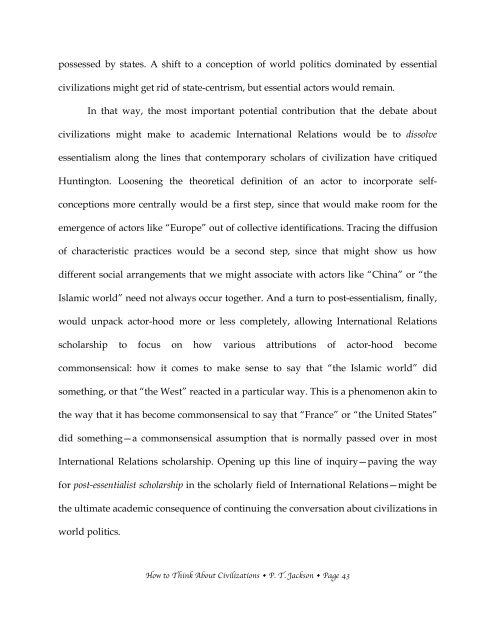How to Think About Civilizations - The Watson Institute for ...
How to Think About Civilizations - The Watson Institute for ...
How to Think About Civilizations - The Watson Institute for ...
You also want an ePaper? Increase the reach of your titles
YUMPU automatically turns print PDFs into web optimized ePapers that Google loves.
possessed by states. A shift <strong>to</strong> a conception of world politics dominated by essential<br />
civilizations might get rid of state-centrism, but essential ac<strong>to</strong>rs would remain.<br />
In that way, the most important potential contribution that the debate about<br />
civilizations might make <strong>to</strong> academic International Relations would be <strong>to</strong> dissolve<br />
essentialism along the lines that contemporary scholars of civilization have critiqued<br />
Hunting<strong>to</strong>n. Loosening the theoretical definition of an ac<strong>to</strong>r <strong>to</strong> incorporate selfconceptions<br />
more centrally would be a first step, since that would make room <strong>for</strong> the<br />
emergence of ac<strong>to</strong>rs like “Europe” out of collective identifications. Tracing the diffusion<br />
of characteristic practices would be a second step, since that might show us how<br />
different social arrangements that we might associate with ac<strong>to</strong>rs like “China” or “the<br />
Islamic world” need not always occur <strong>to</strong>gether. And a turn <strong>to</strong> post-essentialism, finally,<br />
would unpack ac<strong>to</strong>r-hood more or less completely, allowing International Relations<br />
scholarship <strong>to</strong> focus on how various attributions of ac<strong>to</strong>r-hood become<br />
commonsensical: how it comes <strong>to</strong> make sense <strong>to</strong> say that “the Islamic world” did<br />
something, or that “the West” reacted in a particular way. This is a phenomenon akin <strong>to</strong><br />
the way that it has become commonsensical <strong>to</strong> say that “France” or “the United States”<br />
did something—a commonsensical assumption that is normally passed over in most<br />
International Relations scholarship. Opening up this line of inquiry—paving the way<br />
<strong>for</strong> post-essentialist scholarship in the scholarly field of International Relations—might be<br />
the ultimate academic consequence of continuing the conversation about civilizations in<br />
world politics.<br />
<strong>How</strong> <strong>to</strong> <strong>Think</strong> <strong>About</strong> <strong>Civilizations</strong> • P. T. Jackson • Page 43
















